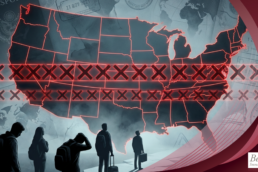Immigration enforcement in the U.S. has become a critical issue, raising concerns about the safety and rights of undocumented individuals, particularly in school environments. While schools are meant to be a safe space for students, reports of immigration enforcement actions near schools have sparked fears among families and educators. This post breaks down key considerations surrounding ICE (Immigration and Customs Enforcement) operations in school settings, including what administrators, educators, and communities need to know.
The Basis for ICE Raids
ICE Raids are legally supported by the Executive Order on ‘Securing Our Borders,’ which focuses on detaining individuals suspected of violating federal or state immigration laws, deporting those who are staying in the U.S. unlawfully, and ending ‘catch-and-release’ practices, which previously allowed undocumented individuals to be released shortly after apprehension.
Since President Trump has returned to office, over 3,500 undocumented migrants have been arrested, signaling a renewed focus on immigration enforcement.
Can Immigration Officials Conduct Raids at Schools?
Schools are designated as ‘sensitive locations’ meaning that enforcement actions, such as raids or arrests, should not take place on school grounds unless there are emergency circumstances or prior approval from senior ICE officials.
However, there have been reports of immigration agents stopping individuals near schools, creating concerns about whether students, parents, and school staff could be targeted. Additionally, the U.S. Supreme Court ruled that public schools must remain accessible to all children, regardless of their immigration status. This means schools have a legal and moral obligation to protect all students, including undocumented children, from undue enforcement actions that could disrupt their education.
What to do if Immigration Officials Approach the School
If ICE Agents arrive at a school, administrators must act carefully and follow legal protocols to protect students and staff. Here are some steps as to what a staff member should do in this situation:
- Direct immigration officials to the Superintendent’s Office, or to a designated administrator’s office
- Request identification and the purpose of their visit
- Ask why the agency is not following the “sensitive locations” policy and demand written authorization for their presence
- Request supervisory approval, as required by ICE policy (approval must come from ICE officials)
- Consult the school district’s attorney before taking any other action
What if Immigration Officials Request Student Records?
Student records are protected under the Family Educational Rights and Privacy Act (FERPA), and cannot be disclosed without parental consent, or a valid court order or subpoena. If immigration officials request records, consult with legal counsel before providing any information, and notify parents before releasing any records unless a court order prohibits notification.
What if Immigration Officials are Stationed Outside of a School?
ICE must obtain supervisory approval before conducting enforcement actions near schools. It is intimidating and often unnecessary for law enforcement to be present on school grounds. Schools and legal advocates should take action to push back against these surveillance tactics.
Conclusion
School leaders, educators, and parents must work together to ensure that schools remain safe havens for all students, regardless of their immigration status. By understanding ICE policies, enforcing legal protections, and engaging legal counsel when necessary, schools can play a vital role in safeguarding students from unjust enforcement actions.
If you are a school administrator or community leader, it is essential to stay informed and prepared in case immigration enforcement becomes an issue at your school. Working with legal experts, advocacy groups, and local officials can help create policies that reinforce the school’s commitment to student safety. For further guidance, reach out to the team at Berardi Immigration Law.
Immigration policies and enforcement actions are constantly evolving. The information in this post reflects the latest updates as of 2/11/2025. We encourage readers to stay informed and consult with legal professionals for the most up-to-date guidance on immigration-related matters.
Disclosure: This document is for informational purposes only and does not constitute legal advice. Immigration laws and regulations are subject to change, and individual cases may vary. For personalized guidance and assistance with your immigration needs, consult a qualified immigration attorney.
Related Posts
January 21, 2026
Success Story: E-2 Employee Visa for Essential Manager
Ready to have Berardi on your side?
Whether you’re a business looking to hire or a professional hoping to relocate, immigration law can be complicated. But you don’t have to do it alone. Put our experience to work for you.



